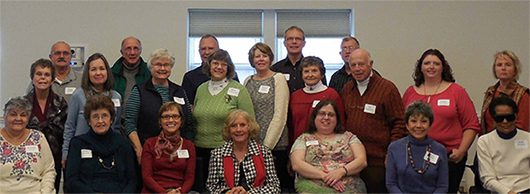Dr. Julie McGregor recently spoke about nutrition and complementary medicine at the Fall 2013 Meeting of the NC/Raleigh Vasculitis Support Group.

Elaine Holmes, the chapter leader of the support group, says that Dr. McGregor’s presentation “generated lots of ideas and discussion about what we can do to improve our own health.”
Dr. McGregor reports that there was great interaction and audience participation during her presentation. Many vasculitis patients in attendance had tried some of the techniques discussed and were able to share their experiences with other participants.
The complementary practices covered in the session included yoga, ayurvedic medicine, and reiki energy healing. Dr. McGregor discussed specific practices and how they can help reduce inflammation and alleviate painful symptoms. She says that these practices can make a difference in a patient’s well-being, and that some have been able to reduce their medicines as a result.
Dr. McGregor shares additional thoughts here about the discussion.
Why did you discuss complementary medicine and nutrition?
Dr. McGregor: I was asked by the Vasculitis Foundation (VF) to present nutrition and complementary medicine at patient breakout sessions at the national meeting in July. Patients were interested in these topics and are not given much information from physicians in either of these areas. Patients received these breakout sessions well and so an attendee from July asked me to present similar information as a lecture for our local VF meeting.
Are patients asking for this kind of information when they come for their visits?
Dr. McGregor: I think many patients have an interest in these topics but may not bring up questions in these areas to doctors. Some patients do ask about nutrition and complementary medicine but many physicians aren’t sure how to answer these questions and the conversation may be uncomfortable or unsatisfying. Amongst those patients who I have spoken with about these topics many of them are trying different nutrition and complementary medicine techniques and having success. A survey done by Libby Berg with vasculitis patients at the UNC Kidney Center found that up to 80% are using some form of complementary medicine.
If someone is looking to improve his or her health, how could that person get started on this path?
Dr. McGregor: My suggestion is to find a technique that “speaks to you” for some reason or is very appealing. Find people who share your interest or someone who can support you in your new endeavors and do some learning. Try one thing and see if it can be incorporated into your life without stress. Slowly increase frequency or broaden horizons without feeling like you have to perfect a technique or go at it every day.
And how can they keep it going long enough to see the benefits? For example, yoga is something that could be hard for someone to stick with long-term. How can they overcome those obstacles?
Dr. McGregor: Find sacred time where no one can bother you, where you dedicate time to yourself- even just 15 minutes where you do something good for you that makes you feel good and improves health. Make these practices as sacred or ritualistic as taking medicine or eating dinner or brushing teeth.
For more information about integrating complementary medicine, you can hear podcasts featuring Dr. Ron Falk, who interviews Chinese medicine physician and acupuncturist Dr. Wunian Chen and integrative medicine physician Dr. Remy Coeytaux. Visit the podcast here.